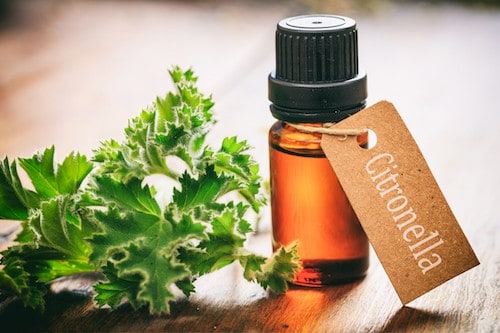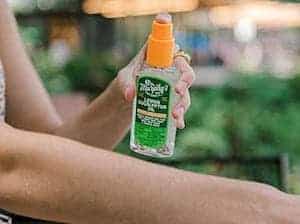Who doesn’t love a great summer backyard get together? You have friends and family, the grill, the games and… the mosquitoes. Those ravenous biting pests can ruin a good time in a hurry. How do you keep mosquitoes out of your yard? It’s going to take more than just a great leaf blower to do the job.
How do you naturally get rid of mosquitos and keep them out of your yard?
Here are 5 ways to naturally get rid of mosquitos:
- Natural mosquito repellent granules
- Plant Based Citronella Candles
- Natural Bug Spray
- Use Outdoor Fans To Repel Mosquitoes
- Mosquito Repelling Plants
5 Ways to Get Rid of Mosquitoes Naturally
1. Natural Mosquito Repellent Granules
Using repelling Granules that are made of a natural and biodegradable ingredients have been proven to repel mosquitoes. The granules are formulated with a variety of natural oils and things like lemon grass to naturally repel mosquitos. Another plus is that it’s environmentally friendly. The Mosquito Beater granules can treat up to 4000 sq. ft. repellant. You will need to reapply it but it does last up to 3 weeks. The granules can naturally repel mosquitoes and other pests in your yard and at other outdoor events.
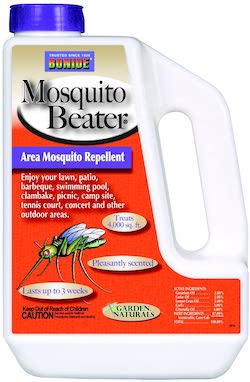
![]()
2. Use Citronella Candles To Keep Mosquitos Away
Candles that is! Citronella candles and luminaries are frequently used in outdoor areas to keep mosquitoes at bay.
For more long-lasting protection look for the added ingredient geraniol. These are safe repellants (as long as not left burning unattended) since they are not dangerous when inhaled like some pesticides. Make sure to check the packaging to know how to place your candles for maximum efficacy. One the we found to be effective and all natural is Mosquito Guard. Mosquito Guard is made with natural plant based ingredients, including citronella, peppermint, rosemary, cedarwood and lemongrass oil. It is completely DEET FREE. This candle is an ideal mosquito protection while outdoors.
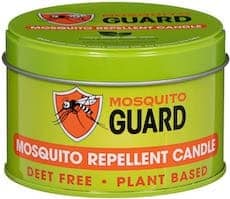
![]()
3. Use Natural Bug Spray To Keep Mosquitos Away
Bug spray is the most common weapon in the backyard battle against mosquitoes. They are available in aerosols or pumps and in with a dizzying array of ingredients. We were able to find Murphy’s Natural eucalyptus oil as a replant that actually works. It provides up to 6 hours of mosquito protection. the combination of lemon eucalyptus oil, distilled water and corn ethanol keep mosquitos at bay while being safe for you and the environment. This is also one of the only plant-based formula recommended by the CDC.
As with sunscreen, you have to reapply your chosen bug spray to keep reaping the bite-free benefits.
4. Use Outdoor Fans To Repel Mosquitoes
According to research, the speed of the fan can help deter mosquitoes, which are naturally weak fliers. Another reason for the fan’s effectiveness is the fact that it disperses carbon dioxide and other chemical cues and odors that mosquitoes use to locate hosts for feeding.
5. Utilize Plants That Are Natural Mosquito Repellants
What plants repel mosquitoes?
Here is our list of plants that help keep mosquitoes away:
- Marigolds have a distinct smell that repels mosquitoes. Try planting them near doors and windows or in pots on a deck or balcony.
- Citronella with its strong aroma is one of the most common ingredients in repellants and can be planted in pots or the ground. Citronella may need to be roughed up a bit to release its oils to be most effective.
- Catnip may attract all the felines but repels pesky skeeters nearby. This is another plant that may need to be crushed up a bit to increase its efficacy.
- Lavender can relax your guests while detouring those uninvited pests.
- Basil is one of the few herbs you do not have to crush to reap its mosquito repelling benefits, though you may be plucking a few leaves to add to your latest recipe. Lemon basil and cinnamon basil are the best varieties for deterring pests.
- Lemon Balm also known as horsemint, repels mosquitoes but attracts pollinators like butterflies and bees. This plant is fast-growing and can take over a space so keeping this one in pots may be your best bet.
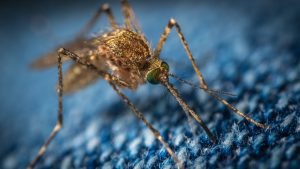
How do I prevent mosquito bites naturally?
As it turns out, prevention is another key to keeping your lawn mosquito-free. To keep mosquitos away you have to utilize natural repellents and remove their breeding sources and preferred habitats. Keep your lawn trimmed and free of debris and drain any standing water. If pests already exist be aware the topical bug sprays and candles won’t address the cause of the problem.
1. Avoid Mosquitos By Covering Up
Wearing lightweight, light-colored clothing is your best bet for attire for the next garden party, mosquitoes are attracted to dark colors. Keeping your feet covered is also recommended as sweat and bacteria make toes a prime target.
2. Utilize Screens Whenever Possible
These maximize airflow but keep pests at bay. There are lots of mosquito net accessories that can be purchased for areas where traditional screens aren’t an option. For example, netting can be purchased that attaches to outdoor umbrellas or pop up rooms that cover an entire deck.
3. Eliminate Standing Water To Get Rid Of Mosquitos
Jim Fredericks, Ph.D., chief entomologist for the National Pest Management Association says, “The good thing is that mosquitoes can’t fly very far, so if you can eliminate breeding spots on your property, you can greatly reduce the number of mosquitoes near your house.” Removing standing water may seem like a no brainer but keeping the kiddie pool drained and the birdbath clean is only the beginning.
There are hidden sources of standing water that are easy to overlook.
- Tarps that cover grills, firewood, boats, and swimming pools have to be pulled taut.
- Keep rain barrels covered and check faucets for drips, even small puddles can be problems.
- Plant saucers are an easy water source to miss and are a favorite of mosquitos.
- Dog bowls that are not emptied and cleaned regularly can become a breeding ground.
- Make sure your gutters are in good working order, low spots and clogs can cause water to pool.
- Lawn equipment like wheel-barrows or even old tires can be overlooked areas.
- Children’s toys such as trucks and shovels need be checked, mosquitos will breed areas of water as small as a bottle cap.
Swimming pools do not pose a problem as long as they are chlorinated and the filters are in working order.
4. Avoid Mosquito Bites By Keeping A Tidy Lawn
Mosquitos don’t just feed on blood but also plant nectar so tall grasses, shrubs and bushes make ideal spots for them stay cool and out of the hot summer sun. Make sure that the area surrounding your home is free of brush and leaf piles, move the leftover firewood away from the house and ensure that the lawn is trimmed. These all make your spaces less appealing to mosquitoes. Evening out low and rough spots in the terrain with topsoil or grass seed not only makes the lawn look nicer but it also reduces puddles.
Recruit The Help Of Professional Pest Control
You can always call a professional in to handle any mosquito situation that seems to be too big to take care of yourself. Professionals can use sprays to provide a protective barrier to kill adult mosquitoes and larvicides to kill them in their larval stage. The barrier spray is usually applied to vegetation with a backpack sprayer. It paralyzes and then kills mosquitoes after they come in contact with it. Most sprays use a botanical pesticide, pyrethrin, derived from chrysanthemum or a pyrethroid, the synthetic compound that mimics naturally occurring pyrethrin.
Pyrethroids are more effective as naturally occurring pyrethrin, it breaks down quickly when exposed to sunlight and moisture. These are deemed safe by the EPA for adults and children but runoff may be harmful to aquatic life.
Larvicides can be used to treat retention ponds, ditches, lakes, and even backyard ponds. The most common larvicide is BTI, Bacillus thuringiensis israelensis, a naturally occurring bacterium. According to the EPA, BTI is non-toxic and safe for mammals, fish, and birds. BTI is only effective at killing larval stage mosquitoes and not adults. BTI can be administered through dissolvable briquettes or backpack sprayer.
RELATED MOSQUITO INFORMATION
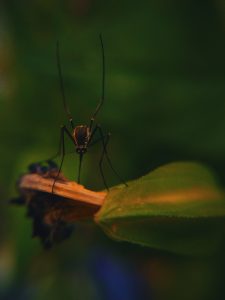 Mosquito Facts
Mosquito Facts
- Breeding occurs when temperatures are consistently above 50 degrees.
- Mosquitoes do not need blood meals to survive but do need them for reproduction.
- Only female mosquitoes bite.
- New crops of mosquitoes will hatch every 10 days unit the first freeze.
- Mosquitoes reach adulthood two weeks after being laid as an egg.
- Most bite during dawn and dusky evening hours but the Zika spreading mosquito bites during the day.
How do You Treat Mosquito Bites?
Don’t Scratch! It may be a tall order but scratching only causes more trauma to the area and openings in the skin that can let bacteria in potentially causing infection. Mosquito bites swell because your body is suffering from a very mild allergic reaction to the mosquito’s saliva. To combat the anti-coagulant delivered by the mosquito, your body releases histamines to fight it. As a result, the area around the bite becomes inflamed and itchy.
- Wash the area with soap and water.
- Apply anti-itch cream or calamine lotion until symptoms subside.
- Use a cold compress, ice pack or cold cloth over the bite to reduce inflammation.
- Try an over the counter antihistamine like Benadryl or Chlor-Trimeton.
- Applying a paste of baking soda and water can help ease the itch.
- Honey may be very useful at reducing inflammation and preventing infection as well as being soothing to the area. The stickiness of honey may also reduce the urge to scratch to avoid a gooey mess.
If a bite causes fever, vomiting, or shortness of breath, call 911 or get to an emergency room immediately.

